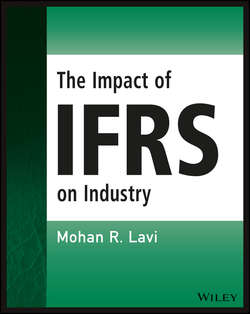The Impact of IFRS on Industry

Реклама. ООО «ЛитРес», ИНН: 7719571260.
Оглавление
Lavi Mohan R.. The Impact of IFRS on Industry
Preface
Acknowledgements
Chapter 1. Introduction: The Background and Evolution of IFRS, and a Discussion on Why IFRS Would Have an Impact on Industry
1.1 Rule-based vs. Principle-based Standards
1.2 The Norwalk Agreement
Chapter 2. Summary of Disclosures Under IFRS Standards
2.1 IFRS 3 Business Combinations
2.2 IFRS 4 Insurance Contracts
2.3 IFRS 5 Non-Current Assets Held for Sale
2.4 IFRS 6 Evaluation and Exploration of Mineral Resources
2.5 IFRS 7 Financial Instruments: Disclosures
2.6 IFRS 8 Segment Reporting
2.7 IFRS 10 Consolidated Financial Statements
2.8 IFRS 13 Fair Value Measurement
2.9 IFRS 14 Regulatory Deferral Accounts
2.10 IFRS 15 Revenue from Contracts with Customers
2.11 IAS 2 Inventories
2.12 IAS 3 Cash Flow Statements
2.13 IAS 10 Events After the Reporting Date
2.14 IAS 11 Construction Contracts
2.15 IAS 12 Income Taxes
2.16 IAS 16 Property, Plant and Equipment
2.17 IAS 17 Leases
2.18 IAS 18 Revenue
2.19 IAS 19 Employee Benefits
2.20 IAS 20 Government Grants
2.21 IAS 21 The Effects of Foreign Currency
2.22 IAS 23 Borrowing Costs
2.23 IAS 24 Related Party Disclosures
2.24 IAS 26 Accounting and Reporting by Retirement Benefit Plans
2.25 IAS 27 Separate Financial Statements
2.26 IAS 29 Accounting in Hyperinflationary Economies
2.27 IAS 33 Earnings Per Share
2.28 IAS 36 Impairment of Assets
2.29 IAS 37 Provisions
2.30 IAS 38 Intangible Assets
2.31 IAS 40 Investment Property
2.32 IAS 41 Agriculture
Chapter 3. IFRS Standards that Could Impact All Industries
3.1 IFRS 1 – First-time Conversion to International Financial Reporting Standards
3.2 IAS 36 Impairment of Assets
3.3 IAS 40 Investment Property
3.4 IFRS 3 Business Combinations
3.5 IFRS 5 Non-Current Assets Held for Sale
3.6 IFRS 8 Operating Segments
3.7 IFRS 13 Fair Value Measurement
3.8 IAS 39/IFRS 9 Financial Instruments
3.9 IFRS 1 °Consolidated Financial Statements
3.10 IFRS 15 Revenue from Contracts with Customers
Chapter 4. The Impact of IFRS Standards on Specific Industries
4.1 Airlines
4.2 Agriculture
4.3 Automotive
4.4 Banking
4.5 Family Controlled Enterprises (FCEs)
4.6 Fast-Moving Consumer Goods (FMCG)
4.7 Government Owned Industry
4.8 Insurance
4.9 Pharmaceuticals
4.10 Private Equity
4.11 Real Estate and Infrastructure
4.12 Oil and Gas
4.13 Media
4.14 Mining
4.15 Retail
4.16 Telecom
4.17 Services
4.18 Shipping
4.19 Small and Medium Enterprises
4.20 Software and Information Technology
Chapter 5. Forthcoming IFRS Standards That Could Impact Industry
5.1 IFRS 16 Leases
5.2 IFRS 4 Insurance Contracts
5.3 SMEs
5.4 Framework
5.5 Other Major Projects
Chapter 6. Collateral Impact of a Transition to IFRS
6.1 Significant Assumptions and Judgement
6.2 The Going Concern Concept
6.3 Information Technology
6.4 Costs
6.5 Accounting Manual
6.6 Taxes
6.7 Presentation of Financial Statements
6.8 Impact of IFRS on Financial Ratios
6.9 Challenges in Implementing IFRS
Afterword
Appendix: Impact Summary
A Snapshot of IFRS Standards that Would Impact Different Industries
Index
Отрывок из книги
During the course of my lectures across India and abroad on International Financial Reporting Standards (IFRS) and other accounting related topics, I was always fascinated by the questions that the participants put forward. Each session was different and so was each question. There were, of course, questions that were not in any way related to accounting or standards but that is to be expected anywhere. Probably what fascinated me more was that accountants were able to pose questions on how, for instance, a refractor should be accounted considering its use, or whether an internally generated brand qualifies for recognition as an intangible asset when the brand has been hypothecated to a bank and funds obtained. Most of my employment was with companies that were based in the United States and hence I had exposure to the industry-specific provisions of US GAAP. As IFRS grew in importance, my mind was filled with thoughts as to how different industries would be impacted if they transitioned to IFRS. Those thoughts are set out in this book.
Having worked in different industries, I have extrapolated an IFRS-implementation scenario in these industries to ascertain the impact. For other industries, I have researched the annual reports of large companies operating in these industries and asked questions of friends and associates working in these industries. As always, the internet threw up way too much information – I have digested this information and present only the relevant parts of which I am absolutely sure, and which are supported by other tangible evidence.
.....
The IASB seems to have found that balance. After IFRS 3, the following standards were issued by the IASB:
It would appear that the IASB too is moving towards industry specific standards in cases where it is felt that the existing accounting standards are not elaborate enough to meet the requirements of the Framework to International Accounting Standards. IFRS 4 Insurance Contracts and IFRS 6 Exploration and Evaluation of Mineral Resources are industry specific. IFRS 14 focuses only on regulatory deferral accounts.
.....